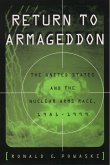Winning Armageddon provides definition to an all-too-long neglected figure of the Cold War, General Curtis E. LeMay, and tells the story of his advocacy for nuclear first strikes while leading Strategic Air Command-the Cold War Air Force's nuclear organization. This was despite a publicly proclaimed policy of deterrence. In telling this story, Albertson builds for the reader a world that, while not in the distant past, has been forgotten by many; the lessons of that past, however, are as applicable today as they were 65 years ago. In weaving his story, the author brings to life the challenges, fears, and responses of a Cold War United States that grappled with a problem to which it did not have a clean solution: nuclear war. It was this concern that LeMay sought to assuage through making his arguments for attacking first in a nuclear conflict-but only if and when it was clear that the enemy was preparing to launch their own surprise strike. This approach, commonly referred to as preemption, was designed to catch an attacker off-guard and prevent the destruction of one's own nation. In LeMay's case, he made the argument that such attacks should initially be directed at an enemy's long-range air forces, in an effort to deprive them of an ability to destroy American cities, industry, and its own military. In so doing, LeMay hoped that rather than plunging the world into a fruitless nuclear exchange he could diffuse the conflict at its outset. It was a novel solution to a vexing problem.
Dieser Download kann aus rechtlichen Gründen nur mit Rechnungsadresse in A, D ausgeliefert werden.









